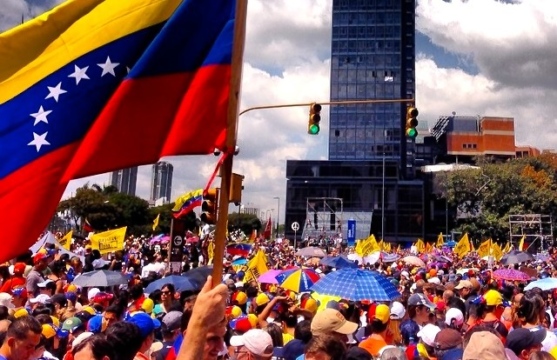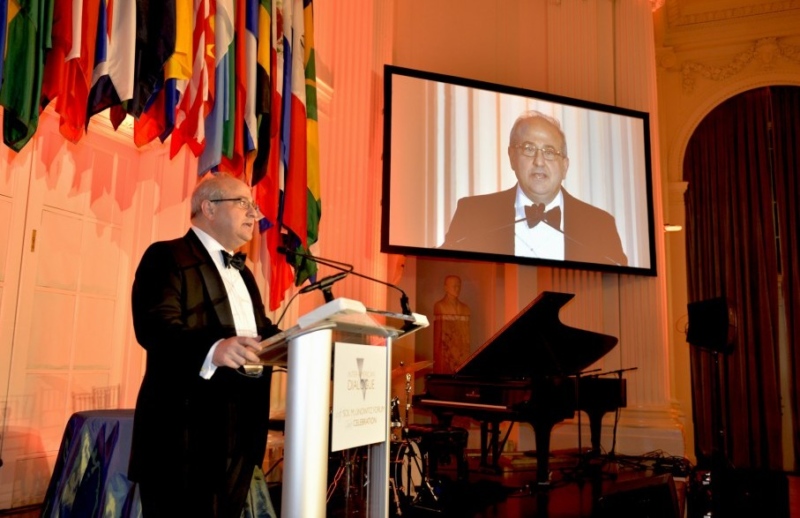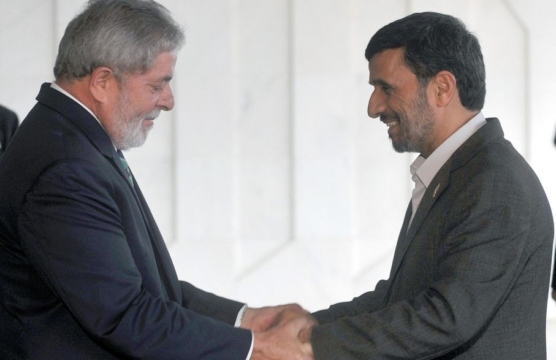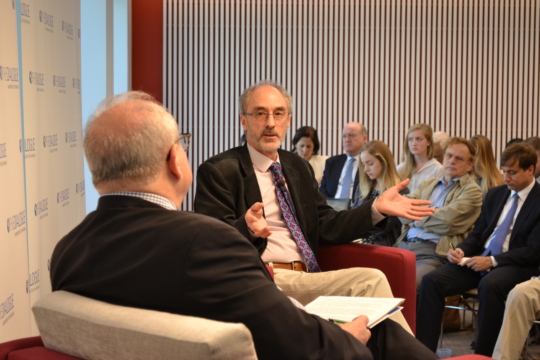
Crisis in Venezuela
There is little doubt that Venezuela’s crises have multiplied and become more serious since Chavez’s death nearly two years ago.
Thank you very much Ray, and thank you, Donna, for your terrific leadership and support of the Dialogue.
Ladies and gentlemen,
Amigas y amigos,
Your Eminence Cardinal McCarrick,
Secretary General Insulza,
Honorees Senator Kaine and Salvador Paiz,
Vice-Chairs, President Enrique Garcia and Mack McLarty,
Other Members of the Board and of the Dialogue,
and distinguished guests (ambassadors, former presidents, foreign minister Martinez),
Good Evening,
Thank you for being here and for your ongoing commitment to the Inter-American Dialogue and the work we do.
I first want to acknowledge the generosity of allour sponsors this evening. They are listed in your dinner programs. Special thanks go to our presenting sponsors, CAF, Liberty Mutual, and Chevron, and to our platinum sponsors, Robert Abernethy, the Tinker Foundation, Procter and Gamble, and Sempra Energy.
I hope you will allow me a brief personal note. That Antonio Madruga’s trio is providing the music for tonight has special meaning for me. Antonio’s father is a close high school friend, who played a big part in introducing me to Latin America that has profoundly influenced my personal and professional life. Antonio is a prodigy who started playing piano when he was 3. He has appeared at Lincoln Center, the White House, and the Kennedy Center. And tonight, the high point of his young career, at an Inter-American Dialogue event!
It’s an honor to be standing here before so many friends on the eve of the 10th Sol M. Linowitz Forum.
The Forum is the centerpiece of the Dialogue’s activities. While the issues we face and discuss have changed dramatically over the years, the Dialogue’s fundamental purpose is unchanged: to foster democratic governance, social progress, and prosperity across the Americas.
In the Dialogue’s extended family, nobody embodied those values better than Peter Bell. More than three decades ago, Peter was one of the Dialogue’s founders. He also served as our co-chair. His passing earlier this year motivates us to work even harder to advance the values he exemplified and inspired us all to live by.
Peter’s career began in Latin America, where he worked with the Ford Foundation in Brazil and Chile. In those countries, elsewhere in the region, and world-wide, he was a tireless champion of human rights. Throughout his life Peter was dedicated to social justice and humanitarian concerns.
This evening I am very pleased to announce that next year, with support from the Ford Foundation, the Dialogue will be launching the Peter D. Bell Rule of Law Program.
(Applause)
This program will bolster and deepen the Dialogue’s core work on democratic governance, human rights and rule of law. Despite enormous strides, these issues remain critical to the region today.
Peter was co-founder of the Dialogue, but he was also the first to recognize the need for the Dialogue to adapt, remain relevant, and constantly renew and reinvigorate its agenda.
To be true to its mission of searching for consensus approaches to address the most salient issues in the Americas, the Dialogue must continue to bring together diverse, often conflicting, perspectives.
But at the same time we must always strive to adhere to the broad principles of democratic governance, accountability and transparency – and to an agenda that promotes economic cooperation and social equity.
The Dialogue’s work cuts across the most crucial issues in the region: rule of law and security problems; education reform; energy and climate change; migration, remittances, and development. It emphasizes Latin America and the Caribbean’s rapidly changing relations with the rest of the world – including, of course, the United States. Our task is to engage global leaders to forge cooperative solutions to shared challenges. Good ideas are important but not enough: we need to make sure they result in sound decisions and practices.
As always, at the center of an ever changing agenda is the Dialogue’s distinguished group of members – our most treasured asset. They drive and help shape our priorities and give our organization its uniquely inter-American character. I’m very pleased to welcome our most recent members who are joining us this evening:
Laura Chinchilla, former President of Costa Rica,
Vilma Martinez, former US ambassador to Argentina,
Rebeca Grynspan, secretary generalof the Ibero-American General Secretariat
I am also honored to welcome a new member to our Board—Roberto Baquerizo, former Central Bank governor of Ecuador, who has made such a crucial contribution on our Gala Committee.
In addition, we’re thrilled that several members of a new Dialogue initiative, The President’s Leadership Council, are here this evening. I am delighted to recognize and welcome:
Felipe Bosch of Guatemala,
Carlos Andres Uribe of Colombia,
Herman Sifontes of Venezuela,
Rodrigo Uribe of Costa Rica
They are among our 15 founding members of the Council and come from 9 countries in Latin America and the United States.
Thanks for your commitment to the Dialogue, for believing in our work and mission, and for helping us move our agenda forward.
I’m looking forward to the next two days of what I am sure will be thoughtful deliberation and spirited dialogue. It’s an exciting moment to take a fresh look at hemispheric affairs.
Now that you’ve heard from me, let me invite you to turn your attention to the screen for a video with words from my bosses, some members of the Dialogue’s board of directors. Thank you so much.
There is little doubt that Venezuela’s crises have multiplied and become more serious since Chavez’s death nearly two years ago.
Iran’s influence in the region, even in the handful of countries where it has been most active, has only declined in recent years.
Is the constituent assembly the real turning point in Venezuela’s crisis? The International Crisis Group’s Phil Gunson reports the view from Caracas.


 Video
Video